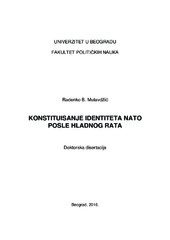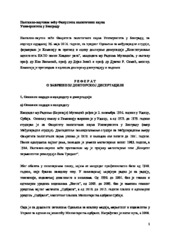Приказ основних података о дисертацији
Konstituisanje identiteta NATO posle Hladnog rata
Constitution of NATO identity after the Cold war
| dc.contributor.advisor | Simić, Dragan | |
| dc.contributor.other | Visković, Ivo | |
| dc.contributor.other | Jović, Dejan | |
| dc.creator | Mutavdžić, Radenko | |
| dc.date.accessioned | 2016-11-06T15:20:15Z | |
| dc.date.available | 2016-11-06T15:20:15Z | |
| dc.date.available | 2020-07-03T09:40:26Z | |
| dc.date.issued | 2016-09-22 | |
| dc.identifier.uri | http://eteze.bg.ac.rs/application/showtheses?thesesId=4002 | |
| dc.identifier.uri | https://nardus.mpn.gov.rs/handle/123456789/6926 | |
| dc.identifier.uri | https://fedorabg.bg.ac.rs/fedora/get/o:13475/bdef:Content/download | |
| dc.identifier.uri | https://fedorabg.bg.ac.rs/fedora/get/o:13588/bdef:Izvestaj/download | |
| dc.identifier.uri | http://vbs.rs/scripts/cobiss?command=DISPLAY&base=70036&RID=517480535 | |
| dc.description.abstract | Predmet istraživanja u ovom radu je izgradnja identiteta NATO, koji danas sebe određuje kao političko-vojnu organizaciju i već šest i po decenija, ponekad i presudno, utiče na međunarodne odnose i bezbednosne procese u svetu. Cilj rada je da se na osnovu teorijske i praktične deskripcije i analize procesa konstituisanja identiteta NATO, uočavanjem različitih dometa pojedinih teorija međunarodnih odnosa i studija bezbednosti u opisivanju, objašnjenju i prognoziranju društvenih pojava i uloge Alijanse u njihovom oblikovanju, pokaže dostignuti nivo izgradnje činilaca identiteta NATO. Da bi se odgovorilo ovom zadatku, u prvom poglavlju izlažu se osnovni koncepti identiteta i bezbednosti kao ključnih kategorija, koje se posmatraju u dinamičnom uzajamnom odnosu, smisao dobijaju društvenom konstrukcijom i proizvodnjom značenja, socijalno su uslovljene i promenljive zavisno od konteksta. U drugom poglavlju izlažu se stavovi tri uticajne teorije međunarodnih odnosa: realizma, liberalizma i socijalnog konstruktivizma, o karakteru, ulozi i budućnosti NATO. U trećem i četvrtom poglavlju, teorijski uvidi iz prva dva poglavlja primenjuju se u studiji slučaja izgradnje identiteta NATO posle Hladnog rata, a težište analize je na promenama karaktera bezbednosnih pretnji i odgovorima NATO koji se opredeljuje za širenje i vojno delovanje izvan svoje teritorije. Peto poglavlje posvećeno je analizi činilaca identiteta NATO: političkog jedinstva, vojnih sposobnosti, razvijene institucionalne infrastrukture i nove bezbednosne kulture. Zbirnim delovanjem grade NATO, koji u novom multipolarnom nadmetanju za raspodelu moći i kontrolu resursa i teritorija, predvođen najjačom silom – SAD, nastoji da spreči opadanje, sačuva i unapredi dostignutu moć i uticaj. | sr |
| dc.description.abstract | This paper studies building the identity of NATO, which now defines itself as a politico-military organization and, for the past six and a half decades, has had, sometimes decisive, influence over the international relations and security processes in the world. The aim of this paper is to show the achieved level of building the NATO identity factors, on the basis of theoretical and practical description and analysis of the process of NATO identity constitution, noticing different range of certain theories of international relations and security studies in describing, explaining and forecasting of social phenomena and the role of the Alliance in their design. In order to accomplish this task, the first chapter addresses the basic concepts of identity and security as key categories, which are viewed in a dynamic correlation, receiving its meaning through social construction and production of meanings, are socially conditioned and variable depending on the context. The second chapter presents the views of three prominent theories of international relations: realism, liberalism and social constructivism, the character, the role and future of NATO. In the third and the fourth chapter, the theoretical insights from the first two chapters are applied in the case study of building NATO identity after the Cold War, and the focus of the analysis is on changing the character of security threats and responses of NATO which opts for the expansion and military action outside its territory. The fifth chapter is devoted to the analysis of NATO identity factors: political unity, military capabilities, developed institutional infrastructure and new security culture; their aggregate action builds NATO, which, in the new multipolar competition for the distribution of power and control of resources and territories, led by the strongest power – the United States, seeks to prevent degradation, preserve and improve the achieved power and influence. | en |
| dc.format | application/pdf | |
| dc.language | sr | |
| dc.publisher | Универзитет у Београду, Факултет политичких наука | sr |
| dc.rights | openAccess | en |
| dc.rights.uri | https://creativecommons.org/licenses/by-nc-nd/4.0/ | |
| dc.source | Универзитет у Београду | sr |
| dc.subject | Identitet | sr |
| dc.subject | Identity | en |
| dc.subject | Security | en |
| dc.subject | Security Community | en |
| dc.subject | NATO | en |
| dc.subject | The Cold War | en |
| dc.subject | Collective Defence | en |
| dc.subject | Partnership | en |
| dc.subject | Crisis management | en |
| dc.subject | Cooperative Security | en |
| dc.subject | bezbednost | sr |
| dc.subject | bezbednosna zajednica | sr |
| dc.subject | NATO | sr |
| dc.subject | Hladni rat | sr |
| dc.subject | kolektivna odbrana | sr |
| dc.subject | partnerstvo | sr |
| dc.subject | krizni menadžment | sr |
| dc.subject | kooperativna bezbednost | sr |
| dc.title | Konstituisanje identiteta NATO posle Hladnog rata | sr |
| dc.title.alternative | Constitution of NATO identity after the Cold war | en |
| dc.type | doctoralThesis | en |
| dc.rights.license | BY-NC-ND | |
| dcterms.abstract | Симић, Драган; Висковић, Иво; Јовић, Дејан; Мутавджић, Раденко; Конституисање идентитета НAТО после Хладног рата; Конституисање идентитета НAТО после Хладног рата; | |
| dc.identifier.fulltext | https://nardus.mpn.gov.rs/bitstream/id/22507/Disertacija.pdf | |
| dc.identifier.fulltext | https://nardus.mpn.gov.rs/bitstream/id/22508/IzvestajKomisije.pdf | |
| dc.identifier.rcub | https://hdl.handle.net/21.15107/rcub_nardus_6926 |



